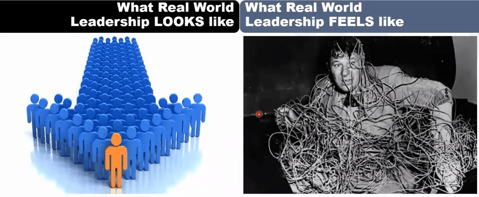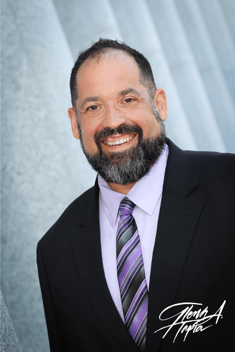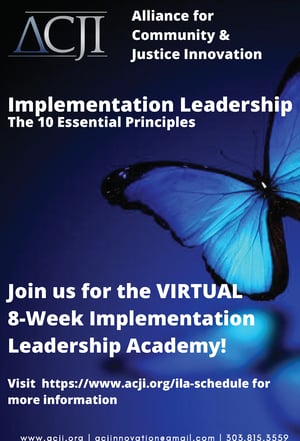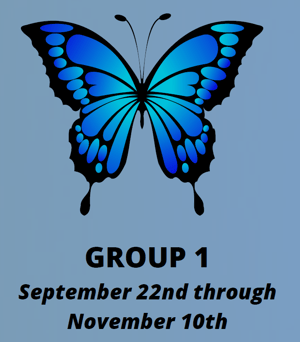10 Essential Principles of Real-World Implementation Leadership
In a time where fear, worry and forced change is at an all-time high, this training could be exceptionally useful for community corrections leaders across the nation. I have been wanting to share this for some time and absolutely loved the 10 Essential Principles of Real-World Implementation Leadership when I attended a short webinar virtually (and this was before COVID-19). As a prior administrator at a residential community corrections agency, I know this training could help leaders in an ever changing industry.
I have witnessed, engaged in, and lost many a battle to the fear to fail, giving in to the resistance and being uncomfortable changing the way we always did things. I saw all these things halt or prolong initiation of innovative programs and processes. I have also been part of innovative programming being implemented when the top leadership was able to trust the vision, curate the right culture and get folks out of their comfort zone. Sometimes people have a natural inclination to stay within their comfort zone and not take any risks, but we can miss some great opportunities for success by doing so. I am guessing many of you can relate to this whether it be your own internal fear or push back from others on your team.
This training and webinar by Glenn Tapia of ACJI, can help leaders who face their own internal struggle and/or push back from others around the table. In this blog I will highlight the top 10 but highly recommend you watch the webinar and even better, find out more about the ACJI Implementation Leadership Academy which is now available in an 8-week virtual/online format. This is just scraping the surface of the content in this webinar. There is much deeper learning in the actual 8 week online academy.
I was lucky enough to be trained by Glenn Tapia when I was a case manager and he was conducting training for the Colorado Division of Criminal Justice. In that time, the SOA-R assessments were revised and being implemented statewide. Glenn has been a part of major implementation change in Colorado and well...he knows what he is talking about! Enjoy!
Implementation Gaps in Criminal Justice
2 Step models to traditional Implementation:
- Persuade & Repeat
- Train & Pray - people do not retain much in a classroom setting (approx. 20%) and this continues to fade as time goes by if there is not continual training and fidelity checks.
- Policy & Procedure
It was not too surprising to hear that the 2-step method has high failure rates. Without guided and directed implementation, only 14% (or worse) of new scientific discoveries (EBP’s) enter day-to-day practices.
In my experience both as an administrator and a trainer, it is all too often that we train on a subject or go over the new policy in a meeting and feel like we checked the box and can move on. Often agencies call a big staff meeting to address something one or two people are not doing right. We hear a lot of (and I can’t deny I’ve said it too) “I told them how to do that”, “we went over this”. The problem is you can’t just tell, show and verbally “review”. It is coaching the staff in real time, watching them, discussing, offering feedback, and repeating. Spend less time talking about it and more time practicing, observing, and doing!
Criminal Justice System Gaps Leading to Ineffective Outcomes:
- Science to Service Gap
- Implementation Gap (Quality, Time, Density)
- Leadership and Culture Gap
What I took from this is that criminal justice agencies sometimes decide to keep doing what they think is best instead of what research and science is telling us works. I remember when developing a new practice model at our community corrections agency, our founder was reviewing risk and need, and we were discussing ways we could manage lower risk clients differently than higher risk. Our founder did a great job of working with case managers who continued to “feel like” this client needed more supervision despite the assessments pointing towards less need. It took a lot of sharing the vision to help people buy in.
If the implementation is not done with passion, fidelity and buy in, it fails. People who already didn’t want to do it in the first place tend to say “see, I knew it wouldn’t work”. But often it is not because the plan was flawed. It was because it wasn’t implemented 100%, nurtured along the way and monitored for fidelity.
Closing the Gap

10 Essential Principles of Real-World Implementation Leadership
1. Trust the Vision
Good is the enemy of great – yes, we fix things that are not broken. Take risks!
Glenn talks a lot about emotional contagion in this section and how our mindset, attitudes and beliefs are contagious with the people we lead and goes into some great detail as to why.
2. Murphy Hates Us
- In the real world stuff goes wrong
- Things go from bad to worse quickly
- Change erodes slowly back to status quo
- Murphy is normal, invite him to your home and ask him to stay for a drink
This just makes me feel better. It’s hard not to feel like you’ve failed when your plan goes wrong, or something comes up you didn’t anticipate. This helps reiterate it is normal, don’t give up at the first road bump. In fact, plan for it.
3. Be Comfortable being Uncomfortable
Implementation Leadership is about moving people from the comfort zone to the growth zone. To succeed you must first improve…to improve you must first learn…to learn you must first fail.
We work in criminal justice and expect our clients to change everything they are comfortable with at a snap of a finger yet we struggle with it just as much. If we can get comfortable being uncomfortable, we will grow and surely empathize and help our staff and clients more with our modeling.
4. Adapt or Die
Symptoms are often cleverly disguised as problems
This is a good perspective many of us have not considered. There may be times we see problems and jump ship. If we evaluate and look closer at the problem, it may be a result of something else.
We must adapt in criminal justice; we all know it is not perfect and must get better results. We will have to continue to implement best practices as we find out more about what is working and what is not, so…adapt or die.
5. Fail Forward – Fail Often
If you want to increase your successes with change…then double your failures
Plan for Failure. That is a hard one for most to swallow. We want to be great at what we do and have all our plans work out. We feel like if we fail the whole thing was wrong. Embracing this is a normal part of the process. I wonder how many great ideas we didn’t try because of our fear to fail.
6. Culture is King
Culture eats strategy for breakfast
We have all seen a cancerous staff member change the entire culture of the company. Setting a positive culture is not easy. When you try and implement processes that do not match with the typical culture, do not be surprised there is no buy in. Leaders really need to live, breath and model what they want their staff to buy and sell too.
7. Lead the Hearts, Lead the Minds
When you influence and inspire others’ mindset, you get to spend less time in governance of their behavior
This may be my favorite. In criminal justice there is so much going on, deadlines, crisis, demands. It is easy to forget why we are doing the work we are doing. Folks who get in this industry are doing it because they believe in making a difference. Leading with this forefront will make anything you are asking of yourself and others feel worth it.
8. Be Intentionally Infinite
- Most of us spend too much time on what is urgent and not enough time on what is important.
- Urgent is often Finite (Fixed Mindset)
- Leading Change is Important and Infinite (Growth Mindset)
So true! It is hard not to be focused on the urgent matters. This is an area that takes some time and spending time on this in training will be invaluable.
9. Take the Leap
People become paralyzed by the fear or not having the perfect solution
Implementation change does take courage, how do folks manage that? It is a great topic for discussion.
10. Savor the Journey
- Human progress is difficult, challenging arduous and wrought with frustration
- Embrace trails and experiences as contributing to the greater body of knowledge on the advancement of human systems.
“Our jobs as change leaders is not to create followers but to create more leaders – BETTER leaders”. I love this point. Implementation takes time and you need leaders all around you to support it. These 10 principles really outline the way leaders can be successful at it. I hope you enjoyed this summary and hope you will take the opportunity to go to the Implementation Leadership Academy!
The Implementation Leadership Virtual Academy applies a mixed-method learning
approach. As a participant, you will be exposed to different methods to learn and
apply the material. Each method is equally important to augment didactic
instruction with live group dialogue, practical exercises, case studies, and
application of specific ACJI tools. A typical week in the virtual academy consists of
the followings events and learning approaches. Each week is approximately 3
hours of live and self-paced work.
Register/get more information by clicking the butterfly links below:
Director of Leadership & Organizational Intelligence
Glenn Tapia has over 30 years of leadership and criminal justice experience in the public sector. His career includes 19 consecutive years with the State of Colorado in strategic oversight and advancement of Colorado’s community-based corrections system and 7 years of upper management experience. He currently is the Director of Probation Services at the State Court Administrators Office. His experience with the state policy process, strategic implementation of evidence -based practices and programs, and multi-level collaboration is augmented with advanced education and experience with academic instruction and professional consultation. Glenn has a strong commitment to excellence in criminal justice administration that is centered in the application of science to public safety policy. Glenn’s current areas of expertise are in Implementation Leadership, Evidence-Based Practices; Sanctions and Incentives; Risk/Need/Responsivity and Risk/Need Assessment; Substance Abuse Treatment Matching; Cognitive Behavioral Therapy; Implementation Science; Adaptive Leadership; the Brain, Habits and Decision Making; Evidence-Based Decision Making for Justice Systems; and Community Based Corrections.
Struggling with all this change? We get it, check out Dr. Alex Walker's webinar and/or blog Mindset Matters : Appreciative Thinking in Times of Crisis.
Want to learn more about coaching in community corrections? Check out our blog series on a Coaching Habit.





